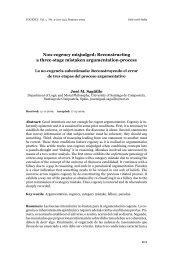Cogency v2 n2
Cogency v2 n2
Cogency v2 n2
Create successful ePaper yourself
Turn your PDF publications into a flip-book with our unique Google optimized e-Paper software.
COGENCY Vol. 2, N0. 2, Spring 2010<br />
(2) If there were no substance, it would be impossible to say anything<br />
sensible (true-or-false).<br />
(3) It is possible to make sense (to say things about the world).<br />
\\ Therefore, there must be ultimate simples.<br />
The third premise is assumed rather than explicitly stated, but since it is<br />
pragmatically impossible to argue with, we will pass over it in silence. The<br />
other two premises can be challenged so they need support. We need a connection<br />
between simples and substance for the first premise and a connection<br />
between substance and sense for the second. Propositions 2.0201 and<br />
2.021 are apparently meant to provide the former; propositions 2.0211 and<br />
2.0212 are apparently meant to provide the latter.<br />
While the logical structure of the argument is straightforward, the conceptual<br />
architecture is not. The lines connecting simples to substance, and<br />
substance to sense are dotted lines at best. Connecting the dots takes effort.<br />
Wittgenstein explains what simples are (the end-products of complete<br />
analyses of complexes) and then states that they are the substance of the<br />
world. The second part of 2.021 is the grounds: complexes cannot be substances.<br />
The missing warrant has to be something to the effect that substances<br />
must exist independently of one another while complexes are dependent<br />
on their constituents. Wittgenstein’s discussion of (atomic) facts<br />
provides the context: they have independent existence, relative to one another<br />
(1.21). However, facts have an internal complexity, so they are also<br />
dependent, relative to their constituents (2, 2.01). At this stage, it would be<br />
possible that those constituents could also be complex (2.0201 does not rule<br />
that out). Genuine objects cannot have any kind of complexity that would<br />
entail dependence and still be the “substance” of the world. One immediate<br />
consequence is that an object’s own logical form cannot be conceived as an<br />
internal structure determining its range of combinatorial possibilities<br />
(2.0141). There cannot be any internal complexity. Rather, logical form must<br />
be an unanalyzable given (and 2.0233 does suggest a sort of brute-fact aspect<br />
to the thisness of objects). Analysis of a complex into its constituents<br />
must be possible (2.0201) and it must come to an end (3.25). The final miss-<br />
28








